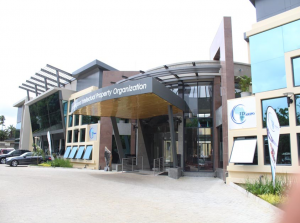ARIPO Model Law (2019) and Nigerian Draft Copyright Bill (2015): 8 comparative points from the emerging copyright landscape in Africa – Part I
This blog post will review the ARIPO Model Law on Copyright and Related Rights[1] against the standards proposed in the Draft Nigerian Copyright Bill.[2] Though Nigeria is currently not a member state of ARIPO,[3] its observer status in the organization makes this comparison a worthwhile one. Therefore, this piece will seek to juxtapose the innovative solutions proffered by the Model Law against that contained in the Draft Nigerian Copyright Bill 2015 (henceforth referred to simply as the “Draft Bill”).

Author: KRESIAH MUKWAZHI
The comparative approach will enable us to assess whether the Model Law has gone further than the copyright reforms proposed in the Draft Bill. It will also afford us the opportunity of assessing the proposed solutions in the Model Law against other global alternatives that have been advanced to improve digital copyright issues. Thus, the following eight topics will be highlighted for discussion.
- Eligibility for copyright protection – the concept of “originality”
An important pre-condition for the copyright protection of a work is that it is an original work. However, the challenge of determining the threshold for originality has rattled copyright policymakers in different jurisdictions. Sometimes, the standard set by national copyright laws has been redefined by a regional legislative intervention (e.g. the definition of “originality” regarding software in the EU Software Directive[4]), or by judicial inventiveness (as in the rich copyright case law definition of “originality” in the USA).
In addressing this issue, section 2(a) of the Draft Bill only requires that the work has an original character without defining what amounts to “original character”. The Model Law, on the other hand, in section 4(3)a stipulates that an eligible work is one in which “sufficient effort” has been expended to give it an original character. This phrase is a re-echo of the previously prevailing standard in the UK. However, even in the UK – at least until the implementation of Brexit enforced legal changes – the notion of “efforts” is fast being replaced with EU accepted notion of “intellectual contributions”.[5]
Therefore, it may be preferable for the phrase “sufficient effort” to be totally expunged from the Model Law and the standard limited to the “original character” of the copyrighted work. The determination of what amounts to “original character” can then be left to the courts in the various member states.
- Ownership of computer-generated works (e.g. AI-generated work)
According to the Model Law, the authorship of a copyrighted work can only lie with a natural person (section 2). Furthermore, in section 8(1)h, the Model Law states that the owner of a computer programme is the “person” that created the code(s). But the question remains, for example, as to who would be the author of works generated by Artificial Intelligence without substantial human involvement? This possibility might not be far-fetched as there are currently plans to generate applications that will enable Artificial Intelligence to substantially write software codes.[6] Who then becomes the author of the codes? The application developer or the writer of the codes itself?
Under the Draft Bill, section 24(1) provides that ownership rest in an author. However, in section 85, it specifically defines an author as a “person” for all the other categories of copyright, except for “literary works” – where it regards the author as the “creator” of the work. Could this be intentional? In other words, since software are regarded as literary works, could we interpret section 85(1) of the Draft Bill to potentially mean that an AI-generated coding could be regarded as the creation of that Artificial Intelligence?
While the legal mechanism for assigning authorship to an AI is far from clear at the moment, it would be appropriate for the Model Law to specifically address itself to such futuristic development. Thus, the Model Law could be revised to envisage the possibility of an AI-generated work, at least with respect to literary works (e.g. software coding). This piece does not, however, campaign for a dramatic shift in the position of the Model Law but only in its recognition of this looming development in the digital copyright world.
- Reciprocal extension of protection to foreign copyright works
One of the notable reforms that the Model Law will bring to the African copyright landscape – at least when compared with the current Nigerian Copyright Act, 2004 – is the abolition of unnecessary bottlenecks in the enforcement of the rights of foreign copyright holders. Section 3(2) of the Model Law provides that the Act shall apply to all works that are capable of being protected in the applicable member states by virtue of its obligations under any international agreements.
The above provision is noteworthy because it does not require the designated Minister of the member state to cause this “reciprocal protection” to be documented by way of a ministerial order, neither does it require a certificate of proof from the national copyright body. These are procedures which are enshrined in section 41 and 5(2) respectively of the 2004 Nigerian Copyright Act.[7]
Fortunately, the “ministerial order” part of these requirements has now been expunged from the Draft Bill, leaving only the part relating to the certificate of proof from the copyright commission (see, section 7(2) of the Draft Bill). With Nigeria’s ratification of the WIPO Copyright Treaty on the 4th of October, 2017, its law could be further brought closer to the ARIPO standard in two ways. First, once Nigeria domesticates all its copyright treaties in line with the provisions of section 12(1) of the 1999 Constitution (as amended),[8] then the requirement for a certificate of proof should automatically cease. Alternatively, the Draft Bill could be further amended to remove the need for such certificate of proof and once passed, it automatically domesticates this reform.
[1] ARIPO. 2019. “ARIPO Model Law On Copyright And Related Rights.” https://www.aripo.org/wp-content/uploads/2019/10/ARIPO-Model-Law-on-Copyright-and-Related-Rights.pdf.
[2] Nigerian Copyright Commission. 2015. Draft Copyright Bill. http://graduatedresponse.org/new/wp-content/uploads/2016/02/DRAFT_COPYRIGHT_BILL_NOVEMBER-_2015.pdf.
[3] “Member States – The African Regional Intellectual Property Organization (ARIPO).” https://www.aripo.org/member-states/
[4] The European Parliament and of the Council. Directive 2009/24/EC on the Legal Protection of Computer Programs. https://eur-lex.europa.eu/legal-content/en/TXT/?uri=CELEX:32009L0024.
[5] Andreas Rahmatian, ‘Originality in UK Copyright Law: The Old “Skill and Labour” Doctrine Under Pressure’ (2013) 44 IIC – International Review of Intellectual Property and Competition Law 4, 5.
[6] “New A.I. Application Can Write Its Own Code.” 2018. Futurity. https://www.futurity.org/artificial-intelligence-bayou-coding-1740702/.
[7] “Copyright Act.” http://www.nigeria-law.org/CopyrightAct.htm.
[8] FOLY. 2014. Constitution of The Federal Republic Of Nigeria, 1999 [With the First, Second and Third Alterations].
—
 Felix Oludare OMOSELE qualified and practised law in Nigeria before venturing out for further studies in Europe. He holds an M.A. in „Public Economics, Law and Politics” from the Leuphana University, Germany. His research interest generally lies in the area of comparative law, particularly relating to Business and Public Law. He has a keen interest in research about the impacts of technology on Intellectual Property Rights, civil evidence, and electoral law.
Felix Oludare OMOSELE qualified and practised law in Nigeria before venturing out for further studies in Europe. He holds an M.A. in „Public Economics, Law and Politics” from the Leuphana University, Germany. His research interest generally lies in the area of comparative law, particularly relating to Business and Public Law. He has a keen interest in research about the impacts of technology on Intellectual Property Rights, civil evidence, and electoral law.
Email: felix.omosele@gmail.com
Twitter: @OmoseleFelix
